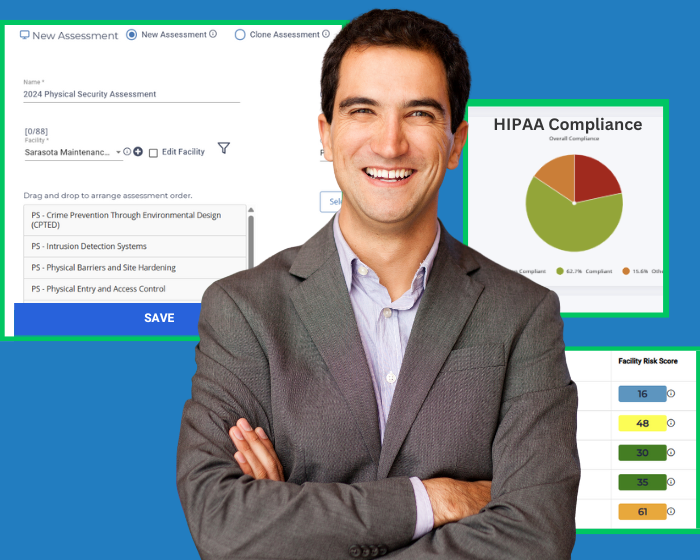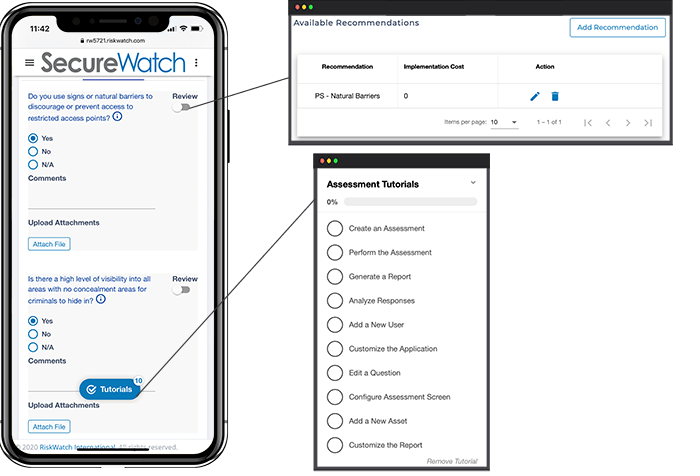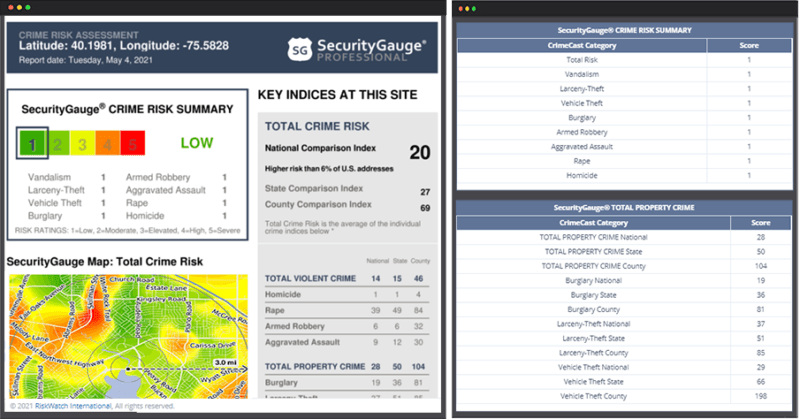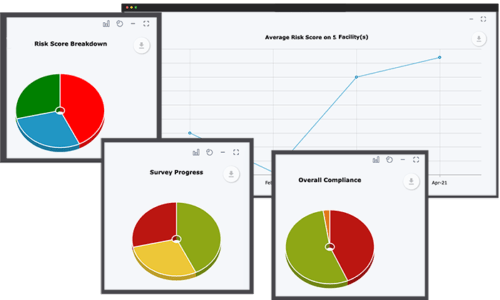RiskWatch partners with third-party data companies to give accurate risk scoring per facility, based not only on your security assessment but also on crime data for the surrounding area as well. Data registers and third-party data providers can be used to populate new assessments with standard sets of data and determine the likelihood of an incident objectively.
HIPAA Compliance Management Software
Streamline Your Healthcare Compliance with Our HIPAA Compliance Assessment Software
Experience seamless and efficient HIPAA compliance with RiskWatch’s HIPAA Compliance Assessment Software. Our platform offers comprehensive tools for risk assessment, ensuring your healthcare organization meets all HIPAA regulatory standards. Simplify your compliance journey with RiskWatch

Recognized For Top Rated HIPAA Compliance Management Software
Everything you need to achieve and maintain HIPAA Compliance

HIPAA Compliance Automation
Streamline your HIPAA journey with a tailored workflow, content, and reports designed specifically for the standard.

Centralized Repository
Captures responses, artifacts, and
evidence for HIPAA controls.

Identify Security Gaps
Identifies gaps and supports the
remediation function to ensure nothing slips through the cracks.

Compliance Reporting
With RiskWatch, you’re not just compliant, you’re confidently compliant. Our automatic report generation educates your team and proves your compliance to stakeholders.

Assign And Track Tasks
Work together with your team seamlessly, share insights, and make collective decisions to manage risks effectively

Trend Analysis
Trending analysis capabilities reuse data gathered over time and visualize your company’s HIPAA compliance improvement each year.
Achieve your HIPAA Compliance Goals with RiskWatch

Automated Assessments
Streamlined HIPAA Risk Assessments
RiskWatch enables customers to streamline HIPAA Security Risk Assessments, completing necessary tasks with ever-increasing efficiency. Our HIPAA Compliance Solution automates functions such as communicating with designated staff members, analyzing data, providing recommended remediation, and writing custom reports.
- Simplify the data entry with easy input assessment questions.
- Take any supplemental photos directly on your device and attach to your responses.
- Gathered information will be uploaded once a stable internet connection is detected.
Risk Scoring
Accurate Security Risk Scoring
- Partners include Cap Index, Security Gauge, and World Aware.
- Increase visibility and transparency with facilities, enabling more insightful decisions.
- Communicate the status of facility security to business stakeholders using a unique security risk rating for each facility.


Automated Analysis
Automated HIPAA Analysis
RiskWatch software streamlines the HIPAA compliance assessment process, using our intelligent analysis methodology to collect all relevant security data and highlighting any security gaps. Our automated HIPAA compliance management aims to improve security positioning without the need to manually compare site data and risk scoring prioritizes projects, allowing you to manage HIPAA security without getting stuck in the weeds.
- Automatically rank sites by risk to prioritize mitigation.
- Understand security at a glance with real-time dashboard analytics.
- 80% time savings when assessments were conducted using previous assessments performed in SecureWatch and compared to a manual assessment process.
Risk Remediation
Suggested Remediation
The RiskWatch platform offers suggested remediation to instances of non-compliance to our content libraries like HIPAA. As assessment information is collected, the platform determines if action should be taken to meet compliance. These can be shown to administrators for review or directly to team members for action.
- Immediately gain a starting point for reaching compliance with your content library
- Reduce time needed to manage your teams remedial tasks.
- Automatically assign tasks within the platform, make adjustments, or leave additional instructions.


Advanced Reporting
Automated HIPAA Reporting
RiskWatch enables customers to standardize and automate reporting functions directly within the platform for HIPAA compliance. Several report templates are included by default, with the added option to create custom templates. Templates can be saved to meet data and visual preferences. With the correct templates saved, generate any report with a single click.
- Save an average of 16 hours per report
- View robust data from multiple sources within a single place.
- Increase transparency with any data available in any format, on demand.
Ready to get started and automate your HIPAA compliance process?
The Challenges
Healthcare organizations grapple with several formidable challenges when it comes to maintaining Health Insurance Portability and Accountability Act (HIPAA) compliance. These challenges include:
Risk Ranking and Assessment: Healthcare professionals face the daunting task of ranking risks. Identifying which areas pose the highest risk to patient data confidentiality and privacy is crucial. However, this process can be intricate due to the diverse nature of healthcare operations.
Detailed Reporting: Accurate and comprehensive reporting is essential for HIPAA compliance. Healthcare entities must create detailed reports based on individual and collective data from various sites. These reports serve as evidence of adherence to industry standards and regulatory requirements.
Resource Allocation Decisions: Allocating resources effectively to address security gaps is a constant challenge. Healthcare organizations must make risk-based decisions on where to invest time, effort, and budget. Balancing preventive measures, incident response, and ongoing compliance efforts requires strategic planning.
Time-Consuming Assessments: Conducting thorough HIPAA security assessments demands significant time and effort. Healthcare professionals need more time for analyzing progress on risk mitigation rather than spending excessive hours collecting and analyzing data.
Roadmap Development: Teams need guidance in developing a clear roadmap for evaluating risks, identifying improvement opportunities, and implementing effective security measures. Without a well-defined path, organizations may struggle to stay compliant.
The Impact
The repercussions of failing to comply with HIPAA regulations can be severe:
Exposure and Vulnerability: Organizations that lack a reliable platform for managing HIPAA compliance may find themselves exposed to security risks. Manual processes and disorganized risk management leave gaps that malicious actors can exploit.
Incomplete Assessments: Imagine healthcare providers unable to complete their required HIPAA assessments. This scenario results in prolonged security gaps, leaving sensitive patient data at risk. Prioritizing the wrong projects while data collection continues exacerbates the problem.
- Financial and Legal Consequences: Violating HIPAA regulations can result in significant financial penalties and legal actions. Non-compliance disrupts operations and damages your reputation.
- Reputation Damage: Trust erosion due to breaches affects patient confidence and relationships with stakeholders.
- Operational Disruptions: Remediation efforts divert resources from core activities, impacting productivity.
In summary, non-compliance with HIPAA jeopardizes your organization’s security, reputation, and growth. Safeguarding patient information is not just a legal obligation; it’s a commitment to ethical care and trust.
Can You Afford HIPAA Non-compliance?
In 2018, Anthem Inc., one of the largest health insurance providers in the U.S., was fined a record $16 million by the Office for Civil Rights (OCR) for multiple HIPAA violations. The company’s lax security measures led to a breach in 2015, exposing the electronic Protected Health Information (ePHI) of nearly 79 million individuals. Violations included insufficient access control, lack of security awareness and training, and failure to conduct regular risk analysis. The victims claimed that Anthem’s negligence in adhering to HIPAA regulations led to this massive data breach. For more information, click here.
HIPAA non-compliance not only leads to hefty fines but also damages your reputation and trust among patients. Can you afford it? Think again.
FAQs
Get answers to some of the most frequently asked questions on our HIPAA Compliance Risk Assessment Platform.
Or head over to the Contact Us page to have a compliance expert reach out to you.
HIPAA Compliance refers to the adherence to the regulations set forth by the Health Insurance Portability and Accountability Act (HIPAA). This act sets the standard for protecting sensitive patient data. Any organization dealing with protected health information must ensure that all the required physical, network, and process security measures are in place and followed
HIPAA compliance is important because it ensures healthcare providers, health plans, healthcare clearinghouses, and business associates of HIPAA-covered entities must implement multiple safeguards to protect sensitive personal and health information. It helps maintain trust, mitigate legal and financial risks, promote efficient operations, prevent data breaches, and enhance reputation.
Enhanced Security: HIPAA Compliance ensures the protection of sensitive patient data, thereby enhancing the overall security of healthcare organizations.
Regulatory Adherence: Compliance with HIPAA helps healthcare organizations adhere to state and federal laws, as well as industry standards.
Risk Management: By adhering to HIPAA regulations, healthcare organizations can effectively manage and mitigate risks associated with the handling of sensitive patient data.
Efficiency: RiskWatch’s platform streamlines the process of achieving HIPAA compliance, thereby increasing efficiency.
Automated Processes: The built-in automation capabilities of RiskWatch’s platform remind users of assessments and assigned tasks to be completed, thereby ensuring continuous compliance.
Real-Time Risk Profiles: RiskWatch’s platform provides real-time risk profiles and scores that update as changes occur, helping organizations stay on top of their compliance status.
Cost Savings: By streamlining the compliance process and reducing the risk of non-compliance penalties, RiskWatch’s platform can help healthcare organizations save unnecessary costs.
Reputation Management: Compliance with HIPAA can enhance a healthcare organization’s reputation by demonstrating its commitment to protecting sensitive patient data.
By providing a HIPAA Compliance Assessment platform to manage and meet multiple regulatory compliance audits and requirements. It includes the entire HIPAA standard.
The role of automated analysis in HIPAA Compliance is to streamline the process of collecting information and producing quantifiable reports. It minimizes human errors and handles large volumes of data.
RiskWatch prioritizes HIPAA risk management by providing a centralized platform that simplifies compliance tracking, reduces risk, and ensures your organization is always audit-ready.
By providing real-time risk profiles and scores that update as changes occur.
RiskWatch can help in reducing unnecessary costs by streamlining the compliance process, reducing the time spent on assessments, and minimizing the risk of non-compliance penalties.
The Health Insurance Portability and Accountability Act (HIPAA) applies to any entity that handles Protected Health Information (PHI). This includes:
- Health Plans: Insurance companies, health maintenance organizations (HMOs), and Medicare Advantage plans.
- Healthcare Providers: Doctors, hospitals, clinics, and other healthcare professionals.
- Healthcare Clearinghouses: Entities that process healthcare claims.
- Business Associates: Organizations that work with covered entities to provide services related to PHI.
The time required to achieve HIPAA compliance depends on various factors, including the size of the organization, the complexity of its data processing activities, and its existing security practices. However, with the right tools and approach, it is possible to achieve compliance within a reasonable timeframe.
The main features of the RiskWatch platform for HIPAA Compliance include Compliance automation,
Pre-built content libraries,
Document storage,
Accuracy and scalability, Collaboration,
Report generation
RiskWatch streamlines HIPAA Compliance assessments by automating workflows, streamlining compliance tasks, and assigning and tracking tasks.
Pre-built content libraries in RiskWatch are libraries that contain industry standards and regulations, lending subject matter expertise and guidance for organizations.
Additional content libraries can be added in RiskWatch by choosing from custom criteria using our Bulk upload option to perform custom assessments.
To generate detailed and customized reports, providing a comprehensive view of your risk profile and compliance status.
RiskWatch compares to manual processes by offering a more efficient and accurate way to manage risk and compliance. It reduces the time spent on assessments and minimizes human errors.
Failure to comply with HIPAA can result in:
- Civil Penalties: Fines ranging from $100 to $50,000 per violation, with a maximum of $1.5 million per calendar year.
- Criminal Penalties: Fines up to $50,000 and imprisonment for up to 5 years for certain violations.
- Reputational Damage: Non-compliance can damage a company's reputation and erode patient trust.
- Operational Disruption: HIPAA violations can lead to operational disruptions and increased costs.
- Legal Actions: Patients can bring legal actions against non-compliant entities.
